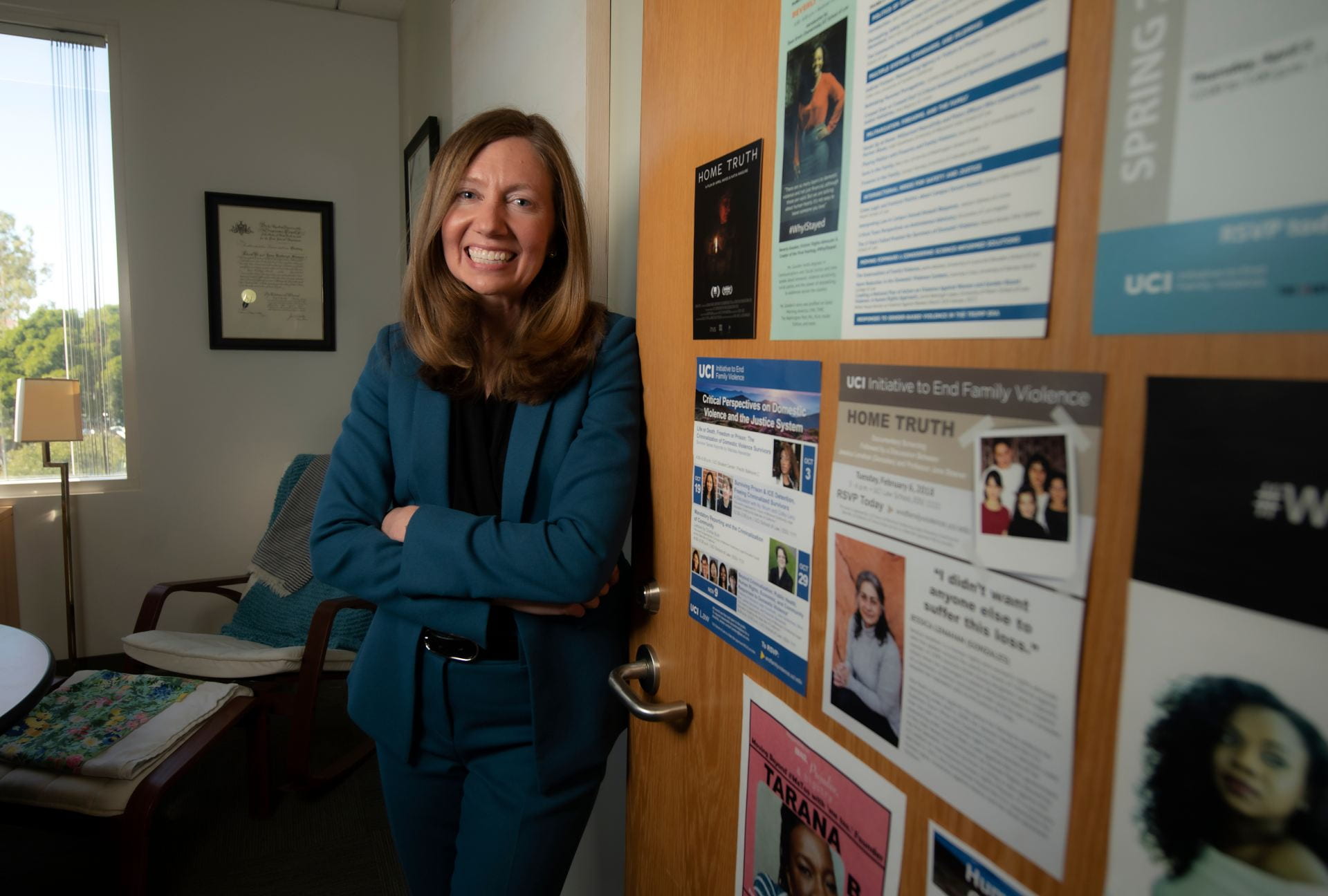Fighting back
UCI’s Initiative to End Family Violence and Domestic Violence Clinic intensify campus efforts to tackle issue

Jane Stoever joined UCI in 2013 with a singular purpose: to expand the university’s commitment and ability to fight family and domestic violence, perhaps society’s most pernicious health, legal, economic, and intergenerational problem. That effort has now led to the milestone UCI Initiative to End Family Violence.
The project had its origins in Stoever’s arrival at UCI. During her first year on campus, the clinical professor of law established the university’s Domestic Violence Clinic, which enabled UCI to grow its preexisting clinic focused on restraining orders by offering law students the opportunity to engage in broader legal representation and advocacy.
“I proposed for it to be expanded from three credits to a six-credit core clinic,” Stoever says. “We represent survivors in civil restraining orders, custody, divorce, immigration, policy work and community education while teaching about critical theory, social movements, and lawyering skills.”
Stoever says she’s grateful that she was able to convince fellow faculty members that the university had a chance to make a real difference in an underserved area of the law while also helping prepare students for legal careers. “There is such a pressing societal need to address domestic and family violence, and our students are able to gain expansive lawyering skills while providing transformative legal representation to clients,” she says. “It’s incredible trial experience.”
Now, with its broadened focus on all areas of family law and immigration relief that pertain to issues of domestic and family violence, the Domestic Violence Clinic can take in 16 new students per year. Each gets direct experience handling cases in various Southern California courtrooms, and many students stay with the program for multiple semesters so that they can continue advocating for their clients.
On campus, the UCI Initiative to End Family Violence stretches beyond the School of Law to other important units, benefiting from the expertise of co-founders Dr. Sandra Murray, a child abuse pediatrician; Dr. Julianne Toohey, a professor of obstetrics and gynecology; Dr. Laura Mosqueda and Dr. Lisa Gibbs, physicians who specialize in elder abuse; and Dr. Ellen Olshansky, founding director of the UCI Program in Nursing Science.
Coming together with co-founders in 2013, Stoever says, “By the time clients come to our Domestic Violence Clinic, there is usually a long history of abuse. We talked about the possibility of taking a much more interdisciplinary approach to the problems I was seeing in our cases, where many revelations about domestic and family violence were being made to medical professionals,” says Stoever, director of the initiative as well as the Domestic Violence Clinic. “We reached out across campus to engage in thinking about ways to solve the problem of family violence, including fields that hadn’t been included before: biological and physical sciences, engineering, information and computer sciences, social ecology and the arts – and now have faculty partners from 11 different schools and 21 departments.”
Awards of nearly 20 interdisciplinary faculty research grants have led to important breakthroughs and substantial federal funding to further research, with examples including “Computer Modeling of Brain Trauma in Children,” “Interrupting the Cycle of Violence Against Commercially Sexually Exploited Children: Interviewing Methods for Eliciting Disclosures,” “Reporting Intimate Violence: Expectations and Experiences Among Women of Color” and “Kavanaugh-Ford: A Triggering Event?”
The initiative’s graduate student fellowship program has enabled over 30 UCI students to engage in community-partnered research, all under the mentorship of initiative faculty members. Judges, health and legal practitioners, scholars, students and community members also participate in the initiative’s conferences and programming.
In both Sacramento and Washington, D.C., representatives of the UCI Initiative to End Family Violence advocate for greater protections for victims of domestic abuse. “We often see ways in which our laws can be improved to address justice gaps and barriers to safety,” Stoever says, “and we’ve been able to put forward legislative proposals.”
Across states, Stoever says, “We’ve primarily worked in the California Legislature. Probably the most well-known bill we’ve proposed is SB 374, which made California the first state to have reproductive coercion added to the definition of domestic abuse.”
She and her team realized that such a law was needed after representing clients whose intimate partners refused to use condoms, a clear violation of their sexual and reproductive autonomy. “There weren’t laws to address this,” Stoever says. “No other states do this yet, but I hope they will.”
Her group also advocated on behalf of SB 935, which allows for renewals of restraining orders when petitioners need ongoing protection from abuse. The law was inspired by a client of the Domestic Violence Clinic who sought a second renewal of a restraining order against her father, who was physically and emotionally abusive and had repeatedly threatened her life with a gun.
Currently, Stoever is advocating for the U.S. Congress to pass the Justice for All Act, which would provide funding to address the estimated 200,000 rape kits nationwide that have yet to be tested for DNA.
“It also gives abuse survivors the right to access federal records of abuse and evidence that they have reported,” Stoever says. “Right now, we have this right on the state level but not at the federal level. While many people think of domestic and family violence as a local issue, it’s much larger and can occur via technology and interstate ways that are increasingly federal.”
Whether it’s working across various departments to better coordinate UCI’s efforts to fight domestic violence or lobbying on Capitol Hill to extend the rights of victims, Stoever says, the UCI Initiative to End Family Violence is making the university a key leader in research and advocacy in this important area of human rights.
“We want to be a resource for Orange County but also beyond the county and nationwide,” she says. “It’s been such a positive experience to be able to have this broader reach.”
If you want to learn more about supporting this or other activities at UCI, please visit the Brilliant Future website at https://brilliantfuture.uci.edu. Publicly launched on Oct. 4, 2019, the Brilliant Future campaign aims to raise awareness and support for UCI. By engaging 75,000 alumni and garnering $2 billion in philanthropic investment, UCI seeks to reach new heights of excellence in student success, health and wellness, research and more. The School of Law plays a vital role in the success of the campaign. Learn more by visiting https://brilliantfuture.uci.edu/school-of-law.


